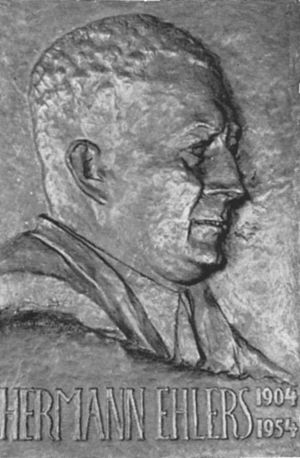Hermann Ehlers facts for kids
Quick facts for kids
Hermann Ehlers
|
|
|---|---|
 |
|
| President of the Bundestag West Germany |
|
| In office 19 October 1950 – 29 October 1954 |
|
| Preceded by | Erich Köhler |
| Succeeded by | Eugen Gerstenmaier |
| Personal details | |
| Born | 1 October 1904 Berlin |
| Died | 29 October 1954 (aged 50) Oldenburg |
| Political party | CDU |
| Spouse | Jutta Taubert |
Hermann Ehlers (born October 1, 1904 – died October 29, 1954) was an important German politician. He served as the second President of the Bundestag (Germany's parliament) from 1950 to 1954. He was a member of the Christian Democratic Union party.
Contents
Early Life of Hermann Ehlers
Hermann Ehlers was born in Berlin, Germany, on October 1, 1904. His parents, Hermann Heinrich Ludwig Ehlers and Adelheid Louise Auguste Rabe, had moved to Berlin. His father got a job with the post office there. Hermann grew up in a family that was well-off, politically traditional, and religious.
University and Student Politics
After finishing vocational school in Steglitz in 1922, Ehlers began studying law. He went to the Humboldt University of Berlin. This was a time of big changes in Germany after World War I. There were revolutions, high prices, and many people out of work.
Ehlers became very active in student groups. One group he joined was the "Verband der Vereine Deutscher Studenten" (United German Student Union). In 1924, he started studying at the University of Bonn. There, he attended lectures by Carl Schmitt, a well-known professor of law.
Schmitt's ideas about strong government influenced Ehlers. Ehlers wrote his main university paper on the "Essence and Effects of an Imperial Prussian State." During this time, Ehlers also became interested in the ideas of Arthur Moeller van den Bruck. He began to support the German National People's Party. This party was a group that came before the Nazi Party.
Life During the Nazi Era
At first, Ehlers was excited when Adolf Hitler became chancellor. Many people felt a new sense of national pride. However, Ehlers' strong Christian beliefs and his work with the church changed his mind about the Nazi movement.
In July 1931, Ehlers passed his law exam. He then started working for the Evangelischen Kirche der Altpreußischen Union (Evangelical Church of the Prussian Union). He continued to work for the church in different roles throughout the 1930s.
In 1937, Ehlers and three other members of the Confessing Church were arrested. The secret police, called the Gestapo, accused them of "disobedience to the state." This happened because the Confessing Church decided to publish the names of people who had left the church for political reasons. Ehlers was not at the meeting where this decision was made. Because of this, he was released from prison after only two weeks.
His arrest showed how carefully he and other church members had to act. They were trying to follow their faith while the Nazi government was in power. Ehlers believed that Hitler's government was against the church. He saw their fight as very important. He once said, "We must go the way of disobedience. This will certainly mean an exasperating fight."
On October 23, 1940, Ehlers joined the military. He was assigned to anti-aircraft warfare in Hamburg. He became an officer candidate in 1942 and a lieutenant a year later. Even while in the military, he stayed committed to the Confessing Church.
Post-War Political Career
After World War II, Ehlers decided to join the CDU party. He made this choice in August 1946 because of his Christian beliefs. He started his political career as a councilman in Oldenburg.
In 1949, he was elected to the German Bundestag. The Bundestag is Germany's main parliament. In 1950, he was elected as the President of the Bundestag. This showed that the CDU party wanted to include people from different Christian faiths.
Hermann Ehlers died suddenly on October 29, 1954. He passed away in an Oldenburg hospital from a serious throat infection called septic tonsillitis.
Family and Lasting Impact
Hermann Ehlers was married to Jutta Taubert, who passed away in Switzerland in 2002. Today, several schools and student dorms in Germany are named after him. The Hermann Ehlers Stiftung still works as a think tank for the CDU party.
Since 2004, the Evangelical Task Force of the CDU/CSU has given out the Hermann Ehlers Medal. This award honors church and political figures who have served evangelical causes.
 | Calvin Brent |
 | Walter T. Bailey |
 | Martha Cassell Thompson |
 | Alberta Jeannette Cassell |

